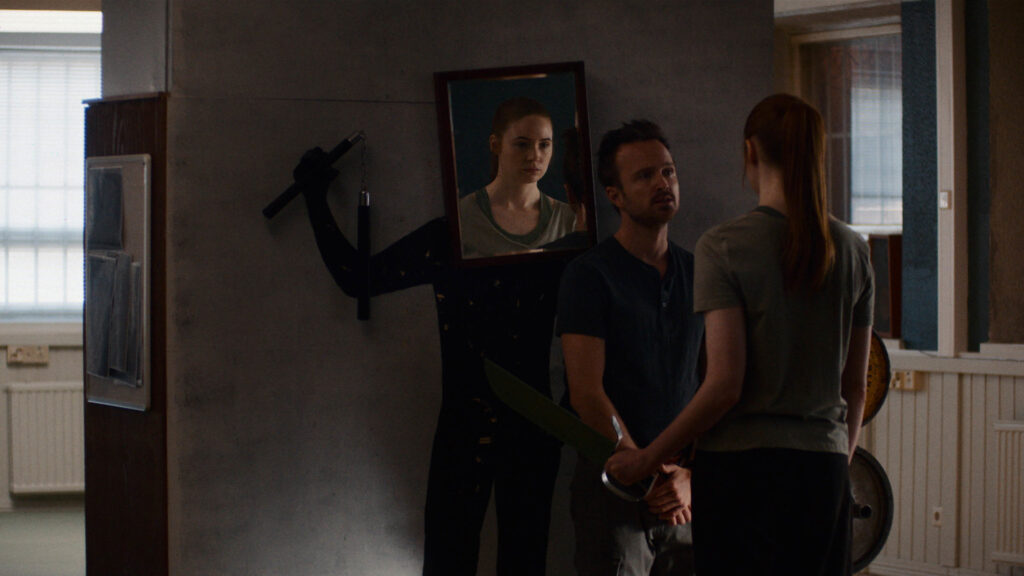Sundance Review: Dual
Written by Ian Thomas Malone, Posted in Blog, Movie Reviews, Pop Culture
Advances in technology may not necessarily allow humanity to cheat death, but maybe help mitigate the circumstances. Cloning strikes at the heart of the nature vs. nurture debate, a person with identical genetic makeup, begging the question of when DNA stops and when individuality begins. The film Dual sorts of centers its narrative around these kinds of themes, never quite sure of what it wants to say.
Sarah (Karen Gillan) is a young woman with a seemingly terminal illness. Set in a future-lite world where cloning is a relatively affordable mass-market commodity, Sarah is supposed to treat her replacement self as a sort of understudy for her remaining days alive in order to make a relatively seamless transition. The clone (also played by Gillan) is supposed to learn what Sarah likes so that she can provide comfort to her loved ones once she dies.
Trouble is, Sarah’s illness goes into remission. Clone Sarah quickly takes on a personality of her own, becoming the preferred Sarah in the eyes of her mother (Maija Paunio) and partner Peter (Beulah Koale). While clones are supposed to be decommissioned in the event of their source material’s survival, the U.S. government apparently ratified the 28th Amendment giving clones the right to opt to challenge their originals to a trial-by-combat style duel on a football field to remain alive.
Director Riley Stearns’ third feature bears the marking of his previous films, namely drab aesthetics and dry, deadpan dialogue. Gillan is a perfect match for Stearns, able to bring both Sarahs to life in the sort of lifeless fashion that has become his trademark. There’s a novelty aspect to Dual’s worldbuilding that works really well, for a while at least.
Despite Gillan’s best efforts, Dual perpetually feels like a half-baked production, a script that gives its cast little to chew on. Sarah is a painfully underdeveloped character, apathetic to such an extent that you can’t help but wonder why she’d even go through the effort of cloning herself at all. That’s not a question that Stearns necessarily needed to answer, but the characters aren’t interesting enough to cover up the broader questions bound to be on the audience’s mind.
There is some charm in Stearns’ minimalist world-building, an uncommon atheistic for a sci-fi premise. One can forgive an intimate indie film for not wanting to deal with the broader geopolitics of cloning. Suspension of disbelief can certainly get the audience through the absolutely clownish idea that America would ever ratify an amendment sanctioning trial by combat for everyday citizens.
The film largely ignores the subject of the morality of the duel, a dynamic that works until a scene in the third act where Sarah suddenly confronts the brutal nature of taking a life, as if she’s just pondering this concept for the first time. In an America that’s divided on every single political issue under the sun, it’s absolutely outlandish that there’s no group around fighting like hell to stop this barbaric sense of justice. This wouldn’t be a problem if Stearns had simply chosen to leave morality out of the equation entirely, allowing his feature to exist in the alternate-America he crafted. Instead, he just looks sloppy for his brief feint toward an idea bound to be on plenty of his audience’s minds.
Some of the film’s best sequences feature original Sarah training with her dueling coach Trent (Aaron Paul), doing their best to transform her into a killer. Stearns struggles to tie his whole feature together in a way that doesn’t leave Sarah and Trent’s time together feeling like charming filler. The obvious comparisons to work displayed in his last feature The Art of Self-Defense hardly helps the situation either.
Dual is never boring across its 94-minute runtime, but the end result leaves a pretty empty experience. Stearns is clearly more concerned with exploring themes than providing answers, but he doesn’t do a good job showing his work to the audience. It’s hard to walk away from this one not feeling disappointed for what might have been if the script had spent a bit more time on the drawing board.











